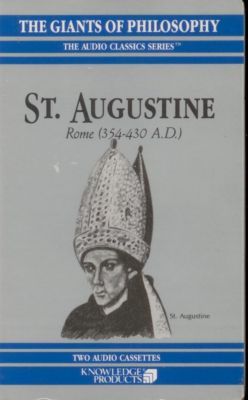- Bible
- Read the Bible
- Bible Versions
- Verse of the Day
- Reading Plans
- Verses by Topic
- Books of the Bible
- Bible Images
- Study
- Commentaries
- Concordances
- Dictionaries
- Encyclopedias
- Sermons
- Bible Atlas & Maps
- BP Wiki
- Devotionals
- Today's Devotionals
- Light of the World
- All Devotionals
- Inspirational Quotes
- More
- Picture Quotes
- Videos
- Inspirational
- Bible Study
- What The Bible Says
- Bible Q&As
- Daily Bread
- Bible by Genre
- Bible Stories
- Random Bible Verse
- Community
- Store
St. Augustine (354-430 A.D.) was the first great systematic Christian philosopher. He attempted to combine the philosophical insights of Plato with the faith explicated in the Bible. Augustine thought of Plato's eternal forms as ideas in the mind of God; he believed that the Eternal Christ provides the light of knowledge to the human mind. For Augustine, every time we make a judgment of relative value, we implicitly acknowledge an absolute standard of value, which is God. His Confessions constitutes one of the timeless statements of faith and self-surrender.
The Giants of Philosophy Series is a collection of presentations, in understandable language, of the concerns, questions, interests, and overall world view of history's greatest philosophers. Special emphasis on clear and relevant explanations gives you a new arsenal of insights toward living a better life.
The Giants of Philosophy Series is a collection of presentations, in understandable language, of the concerns, questions, interests, and overall world view of history's greatest philosophers. Special emphasis on clear and relevant explanations gives you a new arsenal of insights toward living a better life.
BUY NOW
Audiobook
Published January 1st 1990 by Carmichael Knowledge Products
tags: audiobook
© 2025 Bibleportal.com All rights reserved.

Aurelius Augustinus - more commonly "St. Augustine of Hippo," or simply "Augustine" - was a philosopher and theologian, and one of the most important figures in the development of Western Christianity. He framed the concepts of original sin and just war. Augustine was one of the most prolific Latin authors in terms of surviving works, and the list of his works consists of more than a hundred separate titles.
Augustine took the view that the Biblical text should not be interpreted literally if it contradicts what we know from science and our God-given reason. Many Protestants, especially Calvinists, consider him to be one of the theological fathers of Reformation teaching on salvation and divine grace.
... Show more